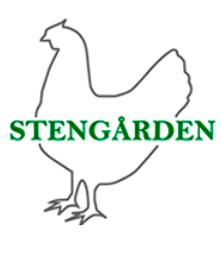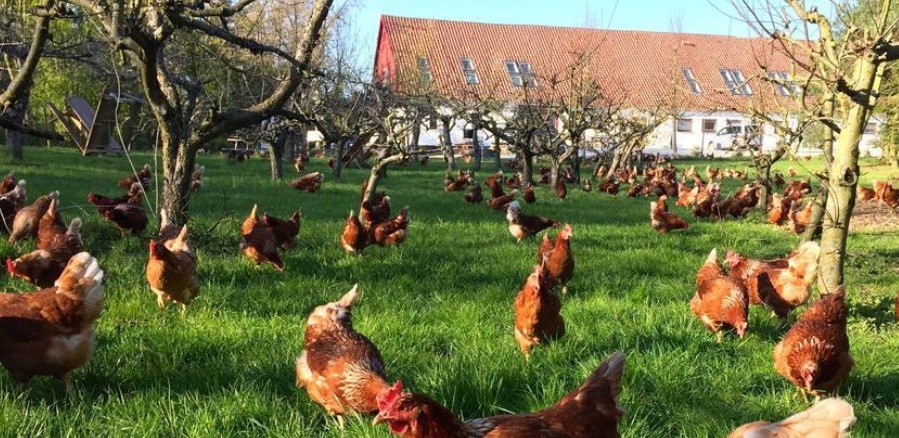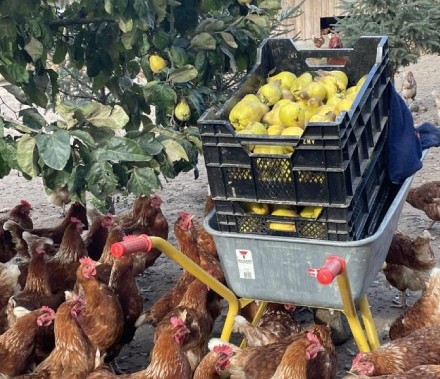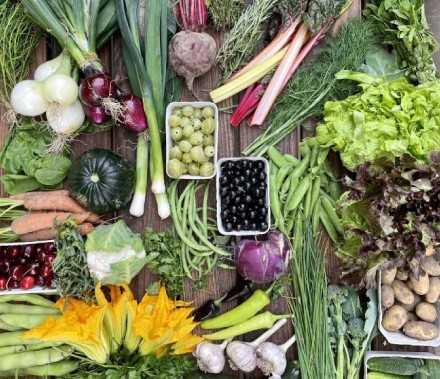
Stengaarden è gestita dalla famiglia Rasmussen dal 1997 ed è diventata un centro agricolo biologico molto diversificato nella regione, vantando il più grande negozio di alimenti biologici in Danimarca. La loro scelta di acquistare e gestire la fattoria nasce dalla loro educazione rurale e dal successivo percorso formativo come ingegneri chimici.
Hanno acquistato la fattoria per creare un buon ambiente per la loro vita e quella dei loro figli. Il piano iniziale era di lavorare part-time come ingegneri e integrare il reddito con cibo coltivato in casa e vendite dirette. Quando hanno preso in mano la gestione, Stengaarden è stata convertita all’agricoltura biologica e hanno rapidamente avviato una vendita porta a porta di uova fresche e buone verdure.
La fattoria si estende su 5 ettari, con oltre 100 varietà di ortaggi, 3000 galline ovaiole, 50 bovini nutriti con erba, 100 ettari di cereali e trifoglio, alveari e il loro dolce e vivace cane Ronja, insieme ai gatti della fattoria. Tutto ciò che coltivano e acquistano da altri produttori biologici (carni e latticini, spalmabili vegetariani, patatine, cioccolatini, oli d’oliva di alta qualità, ecc.) viene venduto nel loro supermercato biologico e caffè/ristorante. Questo modello di vendita consente loro di mantenere una fattoria molto biodiversa e di concentrarsi su varietà antiche e nutrienti. Credono nella biodiversità e in un ciclo autosufficiente all’interno della fattoria, ovvero non utilizzano alcun fertilizzante esterno e quasi nessun mangime animale esterno. In questo modo, cercano di garantire una produzione alimentare sostenibile e di alta qualità, affinché i loro clienti, i dipendenti e loro stessi possano vivere bene.

La fattoria ha ricevuto un finanziamento per la cura di prati e aree naturali. Lo scopo di questo finanziamento è aiutare a proteggere e migliorare le condizioni biotopiche e la biodiversità nelle aree prioritarie. Grazie al finanziamento, i prati e le aree naturali della fattoria sono stati curati con pascolo o falciatura, garantendo così una buona gestione naturale delle aree.
L’azienda ha anche ricevuto un Contributo per l’Agricoltura Biologica per convertire e gestire le aree agricole della fattoria in modo biologico. Lo scopo di questo sussidio è aumentare l’area biologica in Danimarca, ottenendo così numerosi benefici per l’ambiente e la biodiversità. Grazie al sussidio, la fattoria è stata in grado di mantenere la produzione agricola biologica sui terreni agricoli e vendere alimenti prodotti organicamente.


Homepage: https://stengaardenoko.dk/
e-mail: essiruus@gmail.com


